- EQUILATERAL TRIANGLE
- A triangle whose three sides and three angles are equal – see ‘triangle 1)’.

Flag of Carneirinho, Brazil
- EQUIPOLLÉ (or EQUIPOLLÉE)
- The alternative heraldic terms for a checky of nine squares in metal and tincture alternately
(which thus form a cross) – a checky or checkered of nine, a cross equipollé or cross quarter-pierced – but see
‘checky 2) and the note below’.



Arms and Flag of Sé, Portugal;
Arms of Lamas, Portugal
Please note that a cross quarter-pierced need not (although it can) be formed by
an equipollé of nine, and we suggest that a suitable glossary or dictionary of
heraldry be consulted if further details are required.

Flag of Ħ'Attard, Malta
- ERADICATED
- The heraldic term for a tree (or possibly a plant) showing its roots.



Flag of Riedholz, Switzerland;
Flag of Portunhos e Outil, Portugal;
Flag of Vest-Agder, Norway
- ERASED
- The heraldic term used when a charge is cut off as in couped 1), but with
the dividing line ragged or uneven – see couped 1).
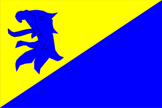
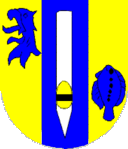
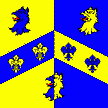
Flag and Arms of Morra, The Netherlands;
Flag of Trinity College – Oxford University, UK
- ERECT
- 1) The heraldic term used when an animal is shown upright or on its hind feet. In certain cases this may be used in place of
"rampant", or may be employed in relation to the heads of animals and fish – but see ‘erect 2)’, ‘haurient’, ‘rampant’ and ‘upright 2)’.
- 2) The heraldic term also used when a charge (often a sword) is shown upright, and employed particularly
when it is not normally seen in that position.



Flag of Gorjani, Croatia;
Arms of Sibenik-Knin, Croatia
Flag of Smokvica, Croatia
- ERMINE
- The heraldic term for the fur of that animal, and usually shown as a semé of small
black trefoils (with larger tails) on a white field (see also ‘furs’,
‘potent 1)’,
‘semé’,
‘trefoil’ and
‘vair’).



Flag of Gistel, Belgium;
Flag of Pays de Dol, France;
Flag of Almanza, Spain
Please note that "ermine" is considered symbolic of royalty, and is (accordingly) often seen
on royal insignia – see pavilion.
- ERRONEOUS FLAG
- 1) A term sometimes used in place of the more precise terms fictional or fictitious flag –
see ‘fictional flag’ and
‘fictitious flag’
(also ‘false flag 1)’).
2) A flag displayed or identified in error/mistakenly.


Erroneous/Fictitious Flag of the Congo from the film
Dark of the Sun; Erroneous/Fictional Flag of Buranda from the TV series
Yes Minister
- ESCALLOP
- The heraldic term for a scallop shell generally (but not exclusively) facing downwards, and often
representing the badge of a pilgrim (see also pilgrim's staff).
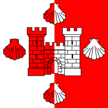
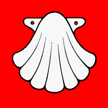

Flags of Saint-Barthélemy,
Buttwil and
Dorénaz, Switzerland
- ESCARBUNCLE
- The heraldic term for a charge with several radiating arms which is meant to represent the
strengthening/decorative metalwork of a shield – a carbuncle or charbuncle.
![[Escarbuncle example]](../images/v/vxt-d1225.gif)
![[Escarbuncle example]](../images/v/vxt-d1225a.gif)
![[Escarbuncle example]](../images/v/vxt-d4743.gif)
Flag and Arms of Re, Vestfold, Norway;
Flag of Gnarrenburg, Germany
- ESCUTCHEON
- The heraldic term for a shield or base upon which charges or quarterings are
placed (see also ‘charge’,
‘impale 1)’,
‘inescutcheon’,
‘quartering’, and
‘shield 1’).
![[Escutcheon example]](../images/v/vxt-d4034.gif)
![[Escutcheon example]](../images/v/vxt-d4744.gif)
![[Escutcheon example]](../images/v/vxt-d2418.gif)
Escutcheons:
Devínska Nová Ves, Slovakia,
Oruro, Bolivia and
Województwo wielkopolskie, Poland
Notes
a) In English heraldry the shape of this shield/escutcheon is considered irrelevant in a grant of arms –
a shape which is (in any case) usually dictated by the current fashion, however.
b) The escutcheon of a spinster or widow is displayed upon a lozenge as referenced above.
![[Escutcheon example]](../images/v/vxt-d2420.gif)
Escutcheon of Kate Middleton before her marriage to HRH Prince William
- ESCUTCHEON OF PRETENCE (or PRETENSE)
- 1) The heraldic term used when one country adds the arms of another to its own in
order to show a claim to all or part of that country – for example: the arms of France
added to those of England from c1350–1801 – but see
‘flag of pretence’.
- 2) The heraldic term also used when the arms of an heiress are placed in the centre of those of her
husband, rather than being impaled – see ‘impaled’.
- 3) See ‘inescutcheon,’
![[Royal Standard 1399]](../images/v/vxt-d1478.gif)
![[Danish royal arms]](../images/v/vxt-d4745.gif)
![[Spanish Royal Standard 1700]](../images/v/vxt-d2421.gif)
Royal Standard, England c1399–1605;
Royal Arms, Denmark;
Royal Standard Spain 1700–1759
- ESTABLISHMENT OF ARMS
- An alternative term for a full set of armorial bearings (see also
‘armorial bearings’ and
‘coat of arms).
![[Establishment of arms example]](../images/v/vxt-d4746.gif)
Flag of Gloucester, UK
- ESTOILE
- The heraldic term for a star or star-like charge that usually (but not
exclusively) has six wavy points, and considered by some sources to be
interchangeable with mullet – see ‘mullet’.
![[Estoile example]](../images/v/vxt-d4582.gif)
![[Estoile example]](../images/v/vxt-d5208.gif)
![[Estoile example]](../images/v/vxt-d4583.gif)
Flag and Arms of Portsmouth, UK;
Flag of St. Hilda's College Oxford, UK
Please note, we suggest that a glossary or dictionary of heraldry be consulted regarding the term given above.
- ETALON FLAG
- See ‘model flag’.
![[Establishment of arms example]](../images/v/vxt-d1447.gif)
Flag of Yukon Territory, Canada (Design Details Established by Etalon/Model
Flag)
- EVENING COLOURS (or COLORS)
- See ‘sunset’.
![[South African ensign]](../images/v/vxt-d3333.gif)
![[South African ensign]](../images/v/vxt-d3334.gif)
Naval Ensign, UK;
Naval Ensign, South Africa 1952–1981
- EVENT FLAG
- See ‘commemorative flag’.
![[26th ICV flag]](../images/v/vxt-d2308.gif)
Flag of the 26th International Congress of Vexillology, Australia
- EVERTED
- An alternative heraldic term to reversed – see ‘reversed 2)’.

- EVOLUTE
- (v) A largely US term for the unrolling of a flag that has been stored rolled
around a tube (see also ‘unfurl’).
- EXECUTIVE ORDER
- In US usage, the legal means by which the President authorizes display of a flag
or the amendment of an established design, and the equivalent of a Presidential Decree
or Royal Order in Council – see
‘presidential decree’,
‘royal decree’ and
‘royal order in council 2)’ (also
‘flag law’).
![[Executive order]](../images/v/vxt-d1399.gif)
![[Executive order]](../images/v/vxt-d4973.gif)
National Flags of the USA 1912–1959 and
1959–1960 as Regulated by Executive Order
- EXPANDING STRIPE(S)
- A term that may be used when a stripe or stripes widen (usually but not invariably) from the hoist
to the fly and start from one fixed point (or from two closely spaced points) as
in, for example, the flags of the Marshall Islands or the Seychelles –
diverging stripes – but see
‘converging stripes’ and
‘beams’
(also ‘radiating 1)’,
‘stripe(s)’ and
‘striped’).
![[Expanding stripes example]](../images/v/vxt-d887.gif)
![[Expanding stripes example]](../images/v/vxt-d888.gif)
National Flag of the Marshall Islands; National Flag of the
Seychelles
Please note that this is not an established term, but has been introduced by the Editors as no suitably accurate alternative could be found
- EX-VOTO FLAG
- A flag, usually small and plain, displayed (especially by Hindus) to fulfil
a religious vow (see also ‘religious flag’).
- EYELET
- See ‘grommet’.
- EYE OF GOD (OF PROVIDENCE or OF DIVINE PROVIDENCE)
- The alternative terms for an ancient symbol composed of an eye contained within by a triangle
now taken to symbolize the Trinity, and usually (but not exclusively) surrounded by a nimbus,
the rays of a sun, a mandoria or similar – the All-Seeing Eye of God, the Eye of Providence or of Divine
Providence, God’s Eye or a Trinity Eye (see also ‘mandoria’,
‘nimbus’,
‘radiant’ and
‘rays 1)’).
![[eye of God example]](../images/v/vxt-d051d.gif)
![[eye of God example]](../images/v/vxt-d051c.gif)
![[eye of God example]](../images/v/vxt-d051e.gif)
Flag of
Goppisberg, Switzerland; Flag
and Arms of
Radzymin, Poland
- EYE SPLICE
- The naval term for a closed loop at the end of a rope or halyard formed by splicing the end of
the rope back into itself to form an eye – a running eye – but see ‘becket’
(also ‘running eye and toggle’
and ‘splice’).
![[eye splice]](../images/v/vxt-d038a.gif)






















![[Escarbuncle example]](../images/v/vxt-d1225.gif)
![[Escarbuncle example]](../images/v/vxt-d1225a.gif)
![[Escarbuncle example]](../images/v/vxt-d4743.gif)
![[Escutcheon example]](../images/v/vxt-d4034.gif)
![[Escutcheon example]](../images/v/vxt-d4744.gif)
![[Escutcheon example]](../images/v/vxt-d2418.gif)
![[Escutcheon example]](../images/v/vxt-d2420.gif)
![[Royal Standard 1399]](../images/v/vxt-d1478.gif)
![[Danish royal arms]](../images/v/vxt-d4745.gif)
![[Spanish Royal Standard 1700]](../images/v/vxt-d2421.gif)
![[Establishment of arms example]](../images/v/vxt-d4746.gif)
![[Estoile example]](../images/v/vxt-d4582.gif)
![[Estoile example]](../images/v/vxt-d5208.gif)
![[Estoile example]](../images/v/vxt-d4583.gif)
![[Establishment of arms example]](../images/v/vxt-d1447.gif)
![[South African ensign]](../images/v/vxt-d3333.gif)
![[South African ensign]](../images/v/vxt-d3334.gif)
![[26th ICV flag]](../images/v/vxt-d2308.gif)
![[Executive order]](../images/v/vxt-d1399.gif)
![[Executive order]](../images/v/vxt-d4973.gif)
![[Expanding stripes example]](../images/v/vxt-d887.gif)
![[Expanding stripes example]](../images/v/vxt-d888.gif)
![[eye of God example]](../images/v/vxt-d051d.gif)
![[eye of God example]](../images/v/vxt-d051c.gif)
![[eye of God example]](../images/v/vxt-d051e.gif)


![[eye splice]](../images/v/vxt-d038a.gif)




